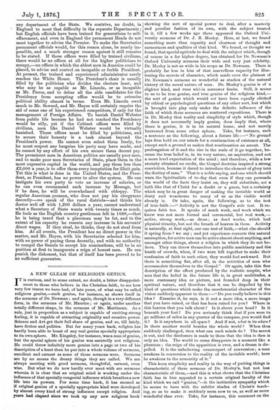A NEW GLEAM OF RELIGIOUS GENIUS.
TT is curious, and to some extent, no doubt, a bitter disappoint- ment ment to those who believe in the Christian faith, to see how very few traces we have had, of late years, of what may be called religious genius,—such genius, for instance, as shows itself in the sermons of Dr. Newman ; and again, though in a very different form, in the sermons of Mr. Maurice ; or again, under another totally different shape, in the sermons of Mr. Martineau. As a rule, just in proportion as a subject is capable of exciting strong feeling, it is capable of attracting originality and creative power. Science and Art get their full share of genius, and so, till lately, have fiction and politics. But for many years back, religion has hardly been able to boast of any real genius specially appropriate to its own sphere. Mr. Kingsley, for instance, was a man of genius, but the special sphere of his genius was assuredly not religious. He could throw infinitely more genius into a page or two of his description of a hunt than he put into a whole volume of sermons, excellent and earnest as some of those sermons were. Sermons are by no means the dreary things they are called. We are always meeting with good sermons, thoughtful, earnest, even wise. But what we do now hardly ever meet with are sermons wherein it is clear that an original mind is working under the influence of that specially congenial influence which breathes a new life into its powers. For some time back, it has seemed as if original genius of a specially appropriate kind were developed by almost every kind of strong influence except religion. And years had elapsed since we took up any new religious book showing the sort of special power to deal, after a masterly and peculiar fashion of its own, with the subject treated in it, till a few weeks ago there appeared the Oxford Uni- versity sermons of Dr. J. B. Motley. Here, at last, we found something more than capacity and clearness of thought and earnestness and qualities of that kind. We found, or thought we found, that special aptitude to deal with the subject which, though of course in a far higher degree, has obtained for Dr. Newman's Oxford University sermons their wide and very just celebrity. Dr. Motley is not so wide in his scope as Dr. Newman. There is probably far less in him of that marvellous capacity for illus- trating the secrets of character, which made even the plainest of Dr. Newman's sermons so wonderful as studies of the natural history of the moral nature of man. Dr. Motley's genius is of a slighter kind, and runs within narrower limits. Still, it seems to us to be true genius, and true genius of the religious kind,— the sort of genius which would not have been equally elicited by ethical or psychological questions of any other sort, but which is brought into play only under the definite influence of the faith of which these sermons are scattered expositions. There is in Dr. Motley that reality and simplicity of style which, though it does not necessarily imply genius, does imply that, where there is genius, it is in its natural home, and not merely borrowed from some other sphere. Take, for instance, such a sentence as the following, about a future life :—" No ground lays firm hold on our minds for a continuation of existence at all, except such a ground as makes that continuation an ascent. The prolongation of it and the rise in the scale of it go together, be- cause the true belief is, in its very nature, an aspiration, and not a mere level expectation of the mind ; and therefore, while a low eternity obtained no credit, the Gospel doctrine inspired a strong conviction, because it dared to introduce the element of glory into the destiny of man." That is a noble saying, and one which should warn the Spiritualists of to-day that even if they can persuade the world of the facts they insist on, they will substitute, not a faith like that of Christ for a doubt or a guess, but a certainty which may be in great danger of making the invisible world as dusty and wearisome to many of us as the visible world already is. Or take, again, the following, as to the test of true faith :—" Activity is not the Gospel's sole test. It re- quires faith too. It speaks of much work, and work which we know was not mere formal and ceremonial, but real work,— active, strong work,—as dross ; as dead works, which had physical vivacity, but not the breath of heaven in them. Activity is naturally, at first sight, our one test of faith,—what else should it spring from ? we say ; and yet experience corrects this natural assumption, for active men can be active almost about anything, and amongst other things, about a religion in which they do not be- lieve. They can throw themselves into public machinery and the bustle of crowds, when, if two were left together to make their confession of faith to each other, they would feel awkward. But there is something flat, after all, in the activities of men who accommodate themselves to the Gospel." Or again, take this fine description of the effect produced by the realistic sceptic, who sees that the belief in the future life is, in great multitudes, a mere customary idea or picture, not founded deep in their spiritual nature, and therefore that it can be dispelled by the kind of questions which make the unsubstantial character of the vision suddenly apparent to them :—" Do you really believe in this idea ? Examine it, he says, is it not a mere idea, a mere image that you have raised, or that has been raised for you? Where is this heaven that you talk about? Is it above your head? Is it beneath your feet? Do you seriously think that if you were to go millions of miles in any quarter of the compass, you would find it? Is it anywhere in all space? And if not, what is its where t Is there another world besides the whole world ? When thus suddenly challenged, then what can such minds do ? The secret is out, and the disclosure is made to them that the idea in them is only an idea. The world to come disappears in a moment like a phantom ; the reign of the apparition is over, and a dream is dis- pelled. It is the unbelieving counterpart of conversion ; a man awakens in conversion to the reality of the invisible world ; here he awakens to the nonentity of it."
This keen simplicity and reality in the way of putting things is characteristic of these sermons of Dr. Motley's, but not less characteristic of them,—and this is what shows that the Christian faith has in him appealed to a certain original faculty of the kind which we call "genius,"—is the instinctive sympathy which he seems to have with the subtler shades of Christ's teach-
ing, so as to make it suddenly seem new to us, as well as more wonderful than ever. Take, for instance, this comment on the often-quoted passage, " Many will say to me in that day, ' Lord, Lord, have we not prophesied in thy name, and in thy name cast out devils, and in thy name done many wonderful works ?' And then will I profess unto them, I never knew you." This, says Dr. Mozley, most truly, "is a very remarkable prophecy, for one reason, that in the very first start of Christianity, upon the very threshold of its entrance into the world, it looks through its suc- cess and universal reception, into an ulterior result of that victory, —a counterfeit profession of it. It sees before the first naked- ness of its birth is over, a prosperous and flourishing religion, which it is worth while for others to pay homage to, because it reflects credit on its champion. Our Lord anticipates the time when active zeal for himself will be no guarantee. And we may observe the difference between Christ and human founders. The latter are too glad of any zeal in their favour, to examine very strictly the tone and quality of it. They grasp at it at once; not so our Lord. He does not want it even for himself, unless it is pure in the individual." Or as Dr. Mozley remarks, in another place, Christ is always reversing human judg- ments, and impressing us, with what we have now the means of knowing to have been his sagacious and salutary distrust of them, even when they seemed most favourable to his purposes. He is san- guine beyond all reason, and yet warns his followers that half their own sanguine judgments will have to be reversed; 'Believe it not,' 'take heed that no man deceive you.' When their hope swells high, then they are to distrust themselves ; and when despair sets in, then they are to distrust themselves still more. The source of their confidence will mortify their hopes and will rebuke their fears ; for it is deeper than either.
Such qualities as we have dwelt upon run through Dr. Mozley's seamons. Nay, now and then they are diversified by some passage showing a power of touch which again recalls the same name we have before ventured to utter in connection with him, Dr. N ewman's. In the passage, for instance, in the sermon on 'The Pharisees,' in which Dr. Mozley contrasts the conscience of the heathens, " this wild, this dreadful, but still this great visitant from another world," full of dark and troubled dreams, awakening them out of their sleep, and urging them to fly, without telling them whither they could fly, with the "pacified," "domesticated," " tame " con- science of the Pharisee, " converted into a manageable, an applaud- ing companion, vulgarised, humiliated, and chained," Dr. Mozley touches a chord which for many a year has been little sounded. For religious genius has long been a stranger to our Churches, though there has been plenty of the best kind of religious purpose and sincerity. It seemed that for a few years the magic spell of Christianity for the heart of Englishmen had thus far been lost, that no special faculty prepared by the past, and fed with the specific food which is alone fitted to stimulate faculty of the higher order, had been germinated by the Christianity of our own day, so that as the greater religious minds of the past lost their control of one generation, none appeared in their place to teach us anew, in the dialect of our own time, the secret of the Christian life. In Dr. Mozley's Oxford University sermons, such a mind, we think, will -be recognised. And certainly those of our readers who have not hitherto come across the book will be grateful to us for drawing their attention to one of the few volumes of really spiri- tual originality which the divinity of our age of lead has succeeded in sending forth.



































 Previous page
Previous page